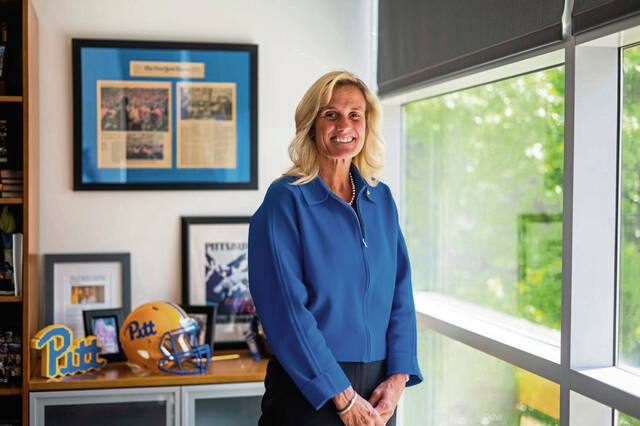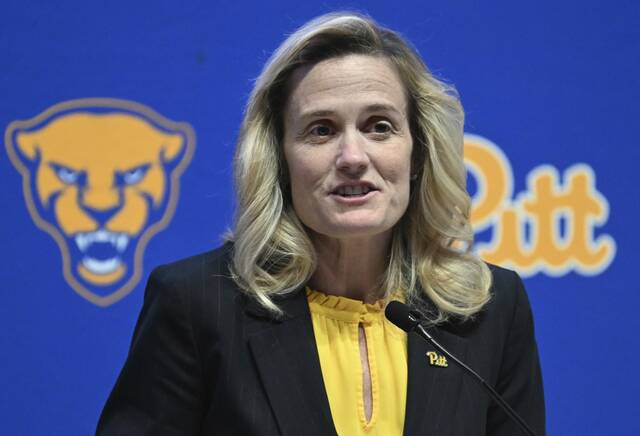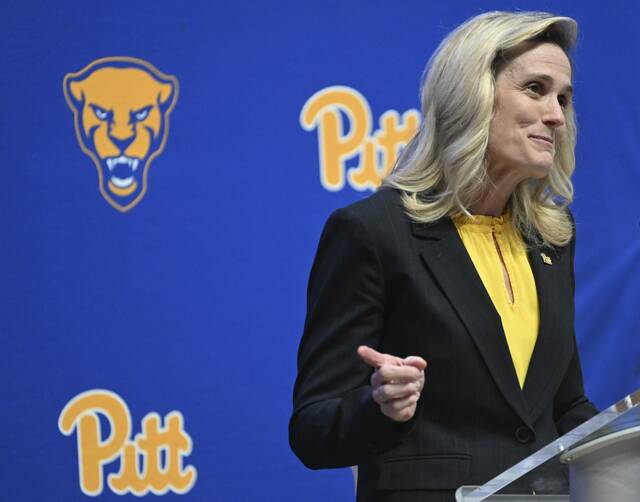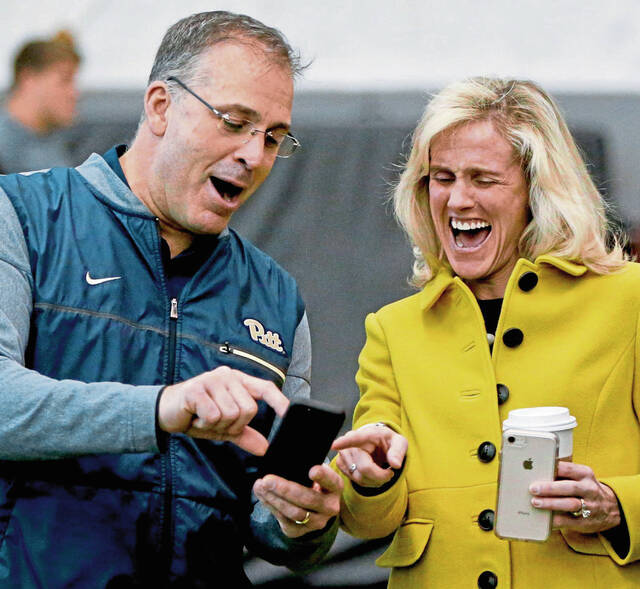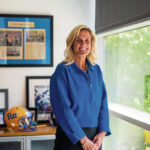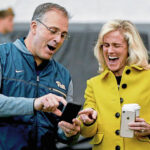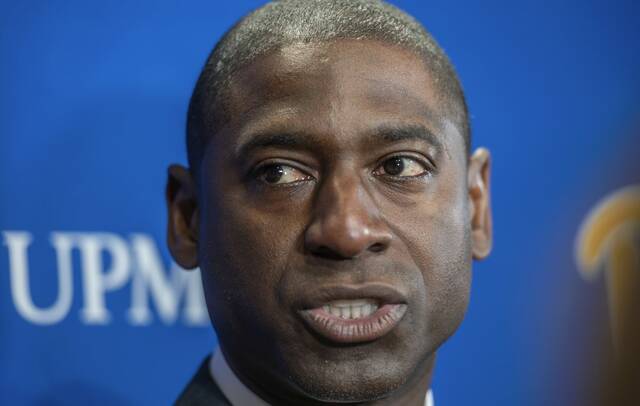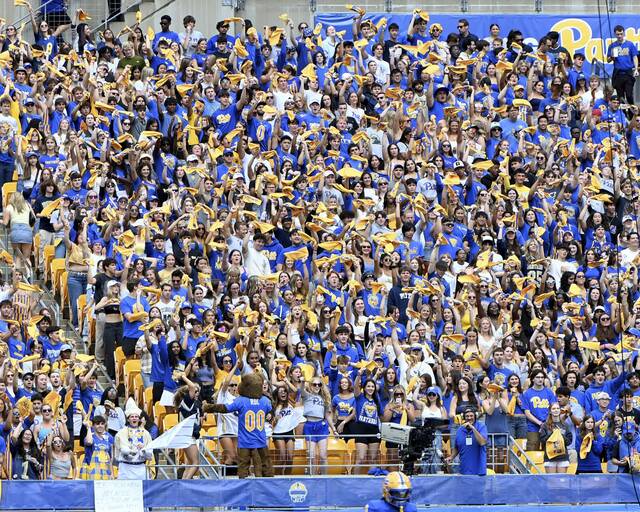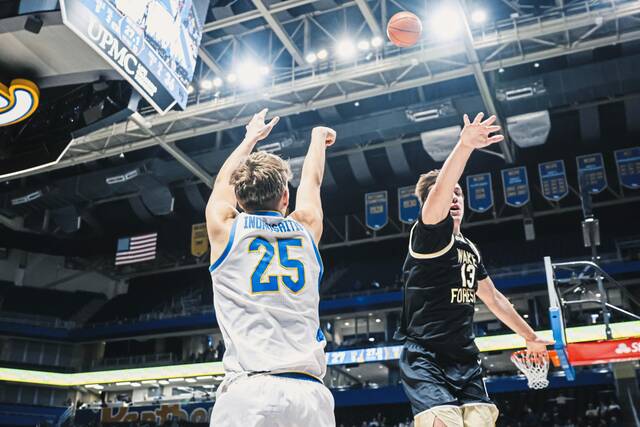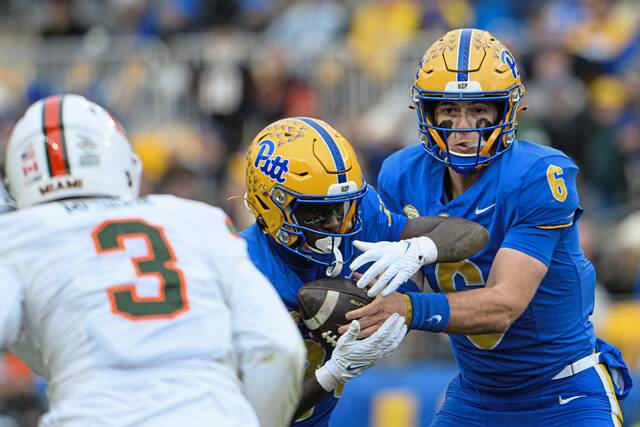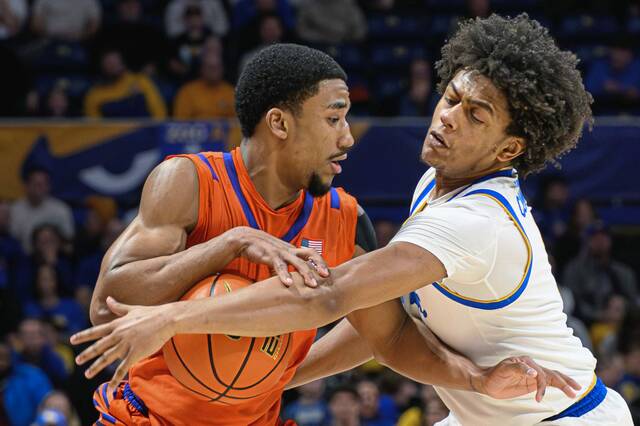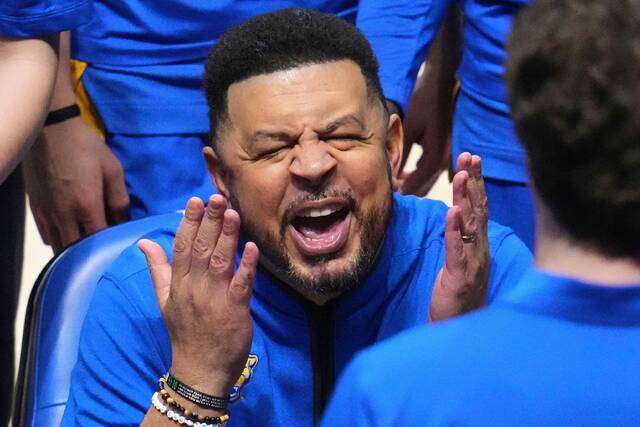One by one, they enter the room.
Pat Narduzzi. Jeff Capel. Jay Vidovich. Dan Fisher. Every head coach of a varsity program at the University of Pittsburgh shuffles into a room in either the Petersen Events Center or the South Side football facility.
They’re all here to meet with their boss, Athletic Director Heather Lyke.
They follow this routine every month — their assistant coaches are invited every other month. This is their face time not only with their boss but also with each other.
Lately, they’ve been arriving with more hardware in tow: ACC championships. College Cup berths. An NCAA title.
From football to men’s soccer to women’s volleyball to wrestling, Pitt is enjoying an athletics renaissance of sorts, success it has not enjoyed in a decade — and in some sports, longer.
The athletic department is realizing a dream mapped out by previous administrations and coaching staffs but rarely achieved.
“The winning has become contagious,” said Patrick Gallagher, the former Pitt chancellor who stepped down last month but under whose watch the athletic revival started and thrived.
Then there is the $240 million Victory Heights project that will sit on 240,000 square feet of the upper campus by 2025. It will include a 3,600-seat arena for wrestling, volleyball and gymnastics. Plus, there will be a sports performance center where nearly 85% of the school’s student-athletes, including the spirit and dance teams, can train. The exceptions are the football team, which trains on the South Side, and the men’s and women’s basketball teams, which reside inside The Pete.
From the chancellor’s office to the head coaches’ quarters, credit for the success is placed at one set of feet: Lyke’s.
History of struggles; modern-day turnaround
At old Pitt Stadium, a wall under the front row of bleacher seats behind an end zone boasted Pitt’s national championship acumen: nine national titles.
The problem was the latest came in 1976. For many Pitt fans, that is as distant a memory as the venerable stadium itself.
Since the departure of Dan Marino and the standout teams of the early 1980s, the Panthers have developed Pro Football Hall of Famers — or future inductees — such as Darrelle Revis, Curtis Martin, Aaron Donald and Larry Fitzgerald. But none of those players could elevate Pitt to consistent national relevance.
That is slowly changing under Narduzzi.
The Panthers finished last season ranked No. 22 — the first time since the 1982 and ’83 seasons that they have finished in the AP Top 25 for two consecutive years. They won the Sun Bowl in December. A year earlier, Pitt captured its first Atlantic Coast Conference title since joining the league in 2013 and played in a New Year’s Six bowl game. Pitt has won 20 games over the past two seasons, the first time that’s happened in 40 years.
Related:
• Pitt chancellor: Multiple factors will play into a new contract for AD Heather Lyke• From QB to athletic office, Pat Bostick continues to leave mark at Pitt
• Mega-donor Chris Bickell helping Pitt level playing field with college football's elite teams
• Wofford's Shawn Watson embraces `the why' of coaching as he prepares his Terriers for Pitt
There seems to be more momentum heading into this season than any previous campaign since Narduzzi was hired Dec. 26, 2014.
Former Florida State quarterback E.J. Manuel, now an analyst for the ACC Network, credited the “DNA of the city of Pittsburgh.”
“When you go there, there’s an expectation of winning,” he said. “I didn’t play at Pitt, but knowing guys who did like Shady McCoy, they have nothing but great things to say about the entire university.
“It’s just the pride that they carry. And not just in sports. They have athletes who go on and do great things in business endeavors as well.”
Capel inherited a program he later, in a moment of unfiltered honesty and perhaps self-defense, described as a “dumpster fire.”
Name, image and likeness guidelines — which allow athletes to land endorsement deals and receive financial compensation — and the loosening of transfer regulations allowed Capel to bring in six new players last season. That helped turn around a program that failed to qualify for the NCAA Tournament in the previous six seasons into one that advanced to the Round of 32.
ACC Network play-by-play announcer Wes Durham, who has called Pitt football and basketball games for years, said it takes time for success to develop.
“The patience of the build can occur,” Durham said, referring to the Pitt administration’s willingness to give a coach time to succeed. “Jeff (Capel) has come in here and done a really good job. You can see the payoff here in a way that is almost exclusive to Pitt.”
Vidovich, the men’s soccer coach, was hired in 2015 by Lyke’s predecessor, Scott Barnes. Vidovich was widely regarded as one of the best coaches — if not the best — in the college game. He had won a national title and five ACC championships at Wake Forest. He inherited a program that had gone 0-22-5 in conference games since joining the ACC in 2013.
Since winning just two games in his first season in Oakland, Vidovich has guided the Panthers to the College Cup — soccer’s equivalent of the men’s basketball Final Four — in two of the past three seasons.
Vidovich wrote Lyke a note when he presented her with the trophy for qualifying for the College Cup.
Lyke said the note read, “Heather, I owe you a better trophy. Thanks for your support.” — Jay
Fisher, the women’s volleyball coach since 2013, has led his program to seven consecutive NCAA Tournament berths and the Final Four in each of the past two seasons while compiling a 61-8 record. Today, the Panthers are one of the top programs in the country.
Other achievements include:
• Bethel Park graduate Nino Bonaccorsi (197 pounds) last winter won Pitt’s first NCAA wrestling title since coach Keith Gavin claimed a title in 2008. Bonaccorsi’s victory prompted Lyke, who hired Gavin in 2017, to remark: “I told Keith that I was tired of saying you were the last NCAA champion at Pitt. Nino took care of that.”
• Coach Randy Waldrum last season led the women’s soccer program to its first berths in the ACC and NCAA tournaments, including a run to the Sweet 16. “We’re walking out with our heads held high,” said Waldrum after the season. Among the team’s achievements were school records in victories (14) and goals (47).
All the right people
When Barnes left Pitt after less than two years to take the athletic director’s job at Oregon State, he acknowledged challenges he faced in Oakland.
When he took the job in 2015, he said he found a “close-to-the-vest culture” that led to some members of the senior leadership team not to speak to each other.
“We had to chip away at that over time,” he said.
Meanwhile, Barnes said he sought transparency with everyone, including donors, staff, coaches and the Board of Trustees.
“Together, we cast a big vision and put a plan in place … that will guide this athletic program for the next decade,” he said at the time.
Perhaps, but many credit Lyke, hired in 2017 as Pitt’s first female AD, for accelerating the process. A year after being hired, Lyke, a former softball first baseman who lettered four seasons at Michigan, received a contract extension through 2024.
Her tenure at Pitt hasn’t come without some nervous moments.
She re-signed Narduzzi in 2017 after a 5-7 season and bowl losses in the previous two seasons.
She hired Capel in 2018 for a program that in two seasons under predecessor Kevin Stallings went from NCAA Tournament regular to a team that finished 8-24 and saw its best players transfer. Capel came with a solid reputation as an assistant at powerhouse and fellow ACC school Duke. But his teams appeared to be getting worse until he took advantage of loosened transfer rules and NIL regulations. Capel parlayed that into a 24-12 record last season.
Lyke said she seeks more than Xs and Os in leaders for her programs.
“They can love gymnastics … or they can love basketball or football. But if they don’t love teaching the game to 18- to 22-year-olds, that’s really the job,” she said in an interview with the Tribune-Review. “Really connecting with the kids and teaching the game and making an impact in those kids’ lives. That’s really important for them to want to make a difference in other people’s lives.
“The other thing is do (coaches) approach the job like ‘What is it going to do for me?’ or ‘What can I do for this place?’ If it’s about ‘What can this place do for me?’, that’s probably not going to resonate very well.”
Lyke’s experience at her previous stops — Ohio State and Eastern Michigan — put her on Gallagher’s radar in 2017. She was part of the Ohio State athletic department’s executive team from 1998-2013.
This year, Lyke was named the Cushman & Wakefield AD of the Year by the National Association of Collegiate Directors of Athletics. With a contract that expires in 2024, Lyke has been mentioned as a possible candidate to replace Gene Smith as Ohio State’s AD when he retires next year.
“I was a part of hiring a lot of coaches at Ohio State and watched (athletic directors) Andy Geiger and Gene Smith both. And Andy would say, ‘Are they in it for the right reasons? Is it about their 100th win or that kid winning a national championship?’
“Keith Gavin is an example of someone who is absolutely in it for the right reasons. He couldn’t wait to have the next NCAA champion (at Pitt). And he knows what it takes to get there.”
In her quest to hire the right coach, she said she looks for experience and playing successes that coaches such as Gavin, baseball coach Mike Bell, Capel and Vidovich have brought to Pitt.
“Keith Gavin, he knows what it’s like to walk out on that mat on the final day (of the NCAA Tournament), and he’s not going to be star-struck,” she said. “And Mike Bell knows what it’s like to pitch in the (College) World Series (at Florida State in 1994 and 1995).”
Spend money to make money
In 2022, Lyke signed Narduzzi to another contract extension — this time through 2030.
Pitt football found the stability it lacked after the short terms of coaches Todd Graham (11 months) and Paul Chryst (three seasons), who immediately preceded Narduzzi.
Stability came at a cost: USA Today reported last year that Narduzzi was paid about $5.6 million — 19th most in the nation and second in the ACC.
In her six years on the job at Pitt overseeing 19 sports, Lyke hired head coaches for all but football, volleyball, track and field, cross country and men’s soccer.
Among men’s head coaches in the ACC, those at Pitt received the highest institutional pay on average at $1.7 million, according to data provided to the U.S. Department of Education.
‘‘If you’re gonna go out and find the best coaches to support our student-athletes, then you have to be competitive in that market,” Gallagher said. “And I think those numbers are reflecting that reality and the fact that we’ve been in the market.”
Additionally, the Pitt administration has increased football coaches’ salaries and provided what Narduzzi said are the necessary resources to sustain success.
“I don’t know what our recruiting budget is,” he said during spring drills this year. “We just do what we need to do. Heather’s never said, ‘You went over, sorry, there are no more visits this weekend.’
“Heather has been awesome. The chancellor (Gallagher) has been awesome. I’m sure we stay under budget, but I’m conscious of what we’re doing, not wasting stuff, doing what we need to do.”
Pitt declined to provide details of its recruiting budget or those related to salary increases for coaches. According to an Equity in Athletics Data Analysis report, Pitt spent about $2 million on recruiting across all sports for the 2021-22 fiscal year, about $15 million on head coaches’ salaries and another $11.7 million on assistant coaches’ salaries. That was the most recent data available.
Another key to Pitt football’s success has been efforts by the administration to keep the staff intact. This is the second offseason among Narduzzi’s eight in which he didn’t need to hire a new on-field assistant.
Credit, again, went to Lyke and Gallagher.
“A year ago, after a championship season, Heather, the athletic department, Chancellor Gallagher stepped up,” Narduzzi said. “We got them paid better than they were. I think that helps a ton.”
“We’ve had a lot of schools wanting to poach our coaches,” defensive coordinator Randy Bates said. “Heather stepped up and kept them, and coach Narduzzi has done a great job of keeping them, and that’s why we’re successful. Because now, Pitt is not a place, stepping-stone-wise. It’s a destination, coaching-wise.”
The plan is paying off, or at least it did in 2021-22.
The ACC reported in May that Pitt received the largest share ($41.3 million) of the conference’s record $617 million in total revenue, an increase of 6.7%, according to the 2021-22 tax document released by the ACC and reported by the Richmond Times-Dispatch. The average distribution to its 14 full members grew 9.7% to $39.4 million.
Pitt’s share was approximately four times what the institution was receiving during its time in its previous conference, the Big East.
Victory Heights vision to fruition
Lyke’s vision for comprehensive excellence — a phrase that often emerges in her public remarks — goes beyond the primary revenue sports of football and men’s basketball. It is taking shape next to the Petersen Events Center, near the state-of-the-art baseball, softball and soccer facilities surrounded by Vera Street, Robinson Street Extension and — appropriately — Champions Drive.
Victory Heights is scheduled to open in 2025.
Jeff and Sandra Martchek emerged as two of the donors who helped move Victory Heights from Lyke’s vision into reality, gifting the university $1.25 million.
“When you looked at the facilities that we were using, Fitzgerald Field House, which was built in the early ’50s, it’s overdue to be replaced,” said Jeff Martchek, a 1987 Pitt graduate who was born in Braddock and has lived in West Mifflin and Greensburg.
“I spent some time on other ACC campuses, looking at facilities, and we were falling behind. Heather was able to get the athletic department and the university aligned to go forward with this.”
Added Sandra: “In talking with Heather, her energy and her enthusiasm, not only for the project but for all of her student-athletes across the board, for all of the teams, it’s just — what’s the word I’m looking for? — contagious.”
Jeff Martchek said he swelled with pride Dec. 30 when the men’s basketball team defeated North Carolina and the football team won the Sun Bowl within hours of each other.
“We can continue to do that,” he said, “but it takes effort, it takes energy, it takes leadership, and it takes capital.”
Before Gallagher stepped down, he continually characterized his support by referencing athletics as the university’s “front porch.” In other words, to get donors, potential student-athletes, coaches, faculty and staff to step inside, the front porch needs to have appeal.
“It lets us be known,” Jeff Martchek said, “and allows us to have a national brand when our athletics compete at a high level.”


